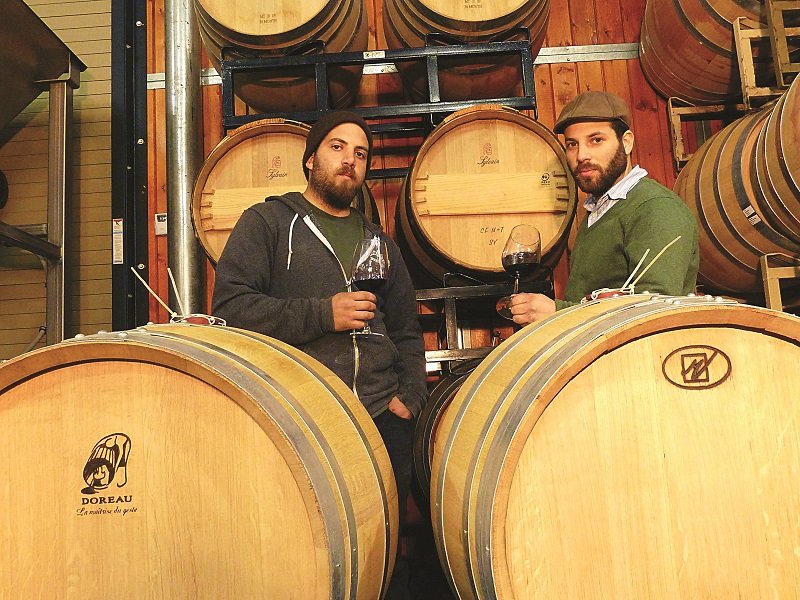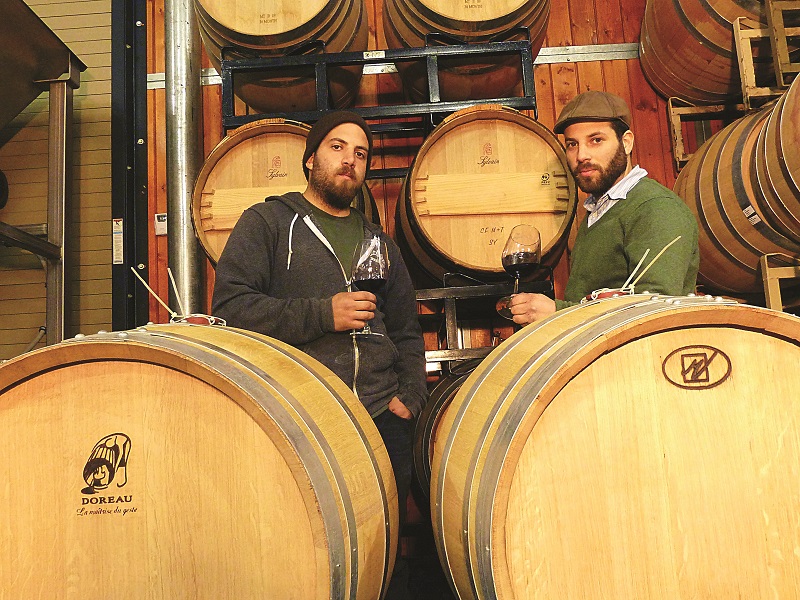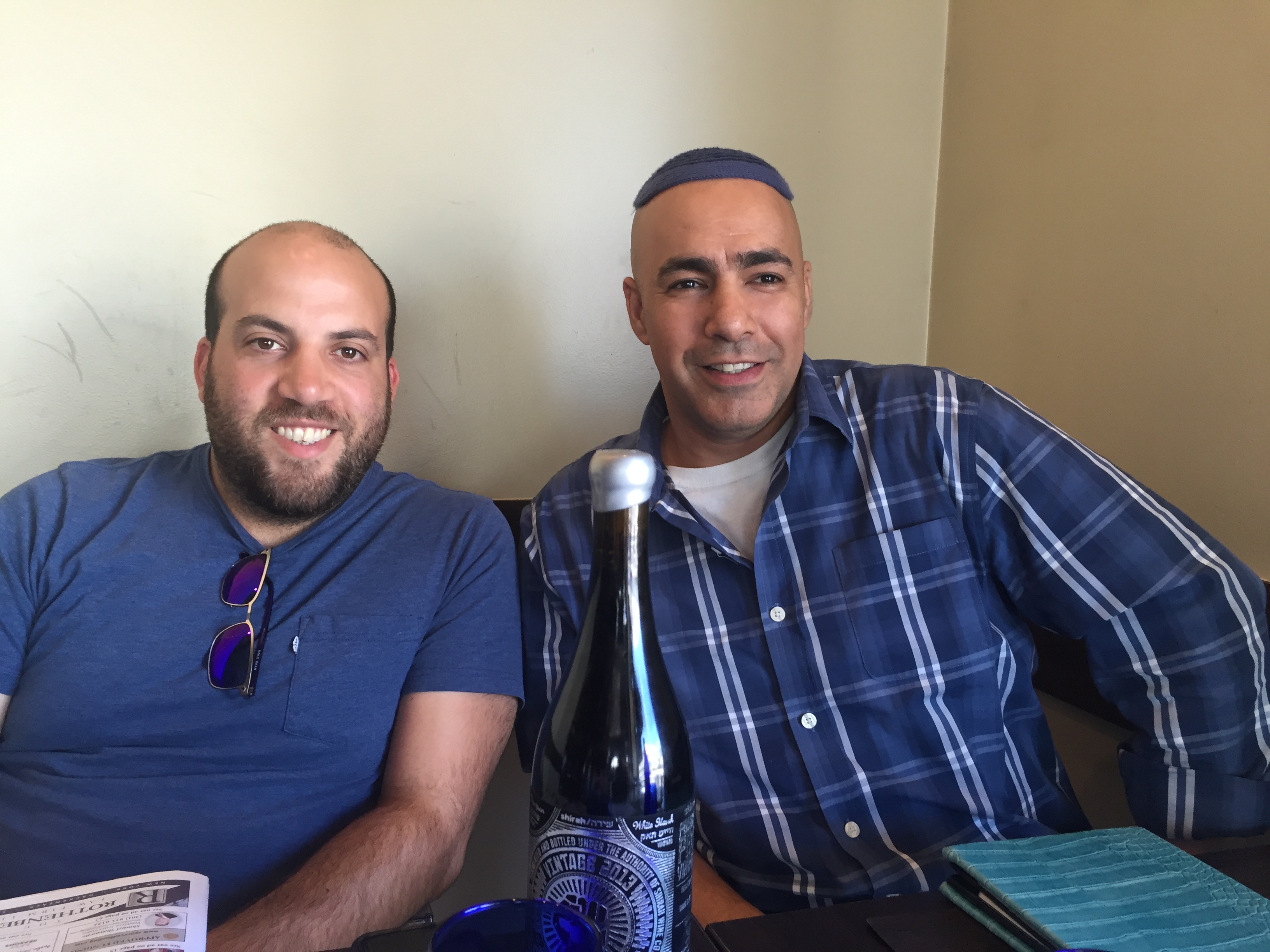A new kosher wine revolution has begun in California. While today there are many good-to-great kosher wines available, a new effort is being made to bring previously unavailable varietals to the kosher marketplace.

The revolution includes exciting wines imported by a growing company called The River Wine, a relatively new importer led by husband and wife team Ami and Larissa Nahari, who have, for the past several years, focused on importing wine from several well-known Israeli wineries, including Tishbi, Beit El and Gush Etzion. The couple’ s main interest is bringing special wines to the kosher market that are innovative, a little off the beaten path, and often, previously unavailable to the kosher consumer.

The Naharis, whose last name translates to “the river,” giving them their company’s name, have recently begun to bring their passion for superior winemaking to an entirely new level. They have teamed up with Gabriel and Shimon Weiss, who, while young, are already legends in the kosher wine world. The very talented small-batch winemakers from California are co-owners of Shirah Wines. The Weiss Brothers, as they are known, have focused on bringing high-end varietals, blends and styles to the kosher consumer that have previously been unavailable.
Together, the Naharis and the Weisses have created a number of new wines under the Twin Suns label, providing wines to the kosher consumer with high-end crafting and ingenuity, but with more accessible pricing. But before one can fully appreciate what Twin Suns is and where it is going, an understanding of what the Weiss Brothers have been doing in California is essential.

Shirah, the Weiss Brothers’ exclusive wine label, garnered significant interest and success over the past decade since they began making “garage wine” during time off working for Herzog vineyards. Their first foray into selling their own wine came in 2009 with 288 cases of a wine called Power to the People. The wine received a score of 90 from kosher wine reviewer Daniel Rogov, z”l, on his 100-point scale. From that bottle’s stylish velvet label designed by their sister, Yael Miller, to the tongue-in-cheek names and quirky label designs (“It’s all about the wording and the typography,” said Shimon Weiss) of their others wines, such as Bro-Deux, Coalition, Counterpunch, Vintage Whites and One-Two Punch, the brothers earned a reputation for making excellent wines that used combinations of varietals differently and more creatively than prevailing winemakers working in the kosher marketplace. While Gabriel is Shirah’ s primary winemaker (“He eats, lives, sleeps, dreams wine,” said Shimon), Shimon had taken on the logistics, managerial and organizational role.

“We started as a Rhone producer. Our growth has happened a bit more gradually. We grew quantities minimally. Now, we produce probably 15 different varietals every season. More Pinot Noir, and more obscure varietals like Aglianico (an Italian black grape),” said Shimon. Shirah wine is now made in Santa Maria, in Santa Barbara County.

Their time as “garagistas” is well behind them, and the respected stature of their brand is recognized easily by the buzz, not to mention the cachet, of each wine’ s release. This includes the release of the 2013 Power to the People, out this month, which retails for approximately $65 a bottle. Power to the People, named as such because it’ s a powerful Syrah (98 percent Syrah and 2 percent Viognier in actuality). “We consider it be a powerful wine and the ‘ people’ is a reference to the Jewish people. When we first got into making wines, we wanted to make powerful wines. One of the vocabulary words we use is power,” explained Shimon.
Shimon said that the 2013 Power to the People was originally set to be released last Pesach, but the team decided to hold it back a number of months (to the following Rosh Hashanah) to ensure it was sufficiently ready for drinking. Describing the 2013 wine, which can be drunk now or cellared for five to six years, Gabriel said: “Power to the People is very obviously full bodied, it’ s very big. The tannins are not very harsh but there is an edge to its structure from its acidity and its extraction. There is a smoky element and a lot of foresty earthiness, and that flavor derives from stems. We made that wine with a fair amount of stem inclusion.” Gabriel explained that 30 percent of the grapes included were crushed as whole clusters, not just the berries, as stem inclusion adds an important element to the structure of the wine. “There is also sort of root beer flavor, or sarsaparilla, which is a flavor I have seen displayed with other Syrahs,” he said.
Gabriel explained that the combination of the Syrah with that little bit of Viognier is taken from a technique used by winemakers in the northern Rhone Valley of France, called Côte-Rôtie (which translates as “roasted slope”) from which Syrah originates. Since Viognier is very aromatic, the small amount in the wine adds a floral note, which is tasted in the background, he said.
But back to Twin Suns: When Ami Nahari of The River met Shimon Weiss of Shirah in 2010 and formed a distribution agreement for The River to distribute Shirah Wines, it was the beginning of a fruitful relationship on a number of levels. “When I met with Ami we really connected. We’ re both Israeli and independent-minded (The Weisses are Sephardi and Nahari is Temeni (Yeminite), so there’ s that connection there. He is a young guy like us and just started his business and was growing,” he said. Shimon added that the two teams connected over business concerns and were good sounding boards for one another.
“We come from the same background, have the same passion for wine and share the vision of bringing the kosher world interesting wines,” added Ami.
“He [Ami] is also committed to growing from the ground up, very grassroots, which is something we relate to. When we are struggling it’ s good to have someone to reach out to. We talk all the time. There is a lot of positivity,” said Shimon.
The Weisses started selling Shirah wines to The River at the end of their very first inventory of Power to the People. “Selling to them was a very big part of enabling us to grow our company. We were modifying our business model to maintain quality. A big selling point of our wines is exclusivity, and going into mass distribution, it takes away from that. So we are constantly working on how much to sell to distribution and how much to keep for our wine club.” Shimon added that The River currently sells two thirds of Shirah wines through its distribution channels and the other third is sold directly to customers through Shirah’ s website.
Conversation then began organically about the Naharis’ and the Weisses’ future aspirations. One of the measures of success in wine distribution is the quantity of wines distributed and the Naharis were looking for a mevushal California wine to add to their otherwise well-rounded portfolio, which also includes an entirely new Italian line of wines called Contessa Annalisa, which debuts this fall as well.
For their part, the Weisses felt they didn’ t really have the capital to grow Shirah exponentially, “but aside from that we don’ t really feel like we would be able to sell so much more [of our high-end wines],” Shimon said. Shimon added that they were also trying to find a sweet spot for their wines, creating a balance between what people generally buy and what the Weisses might be able to present to the market that was different or special. “People’ s buying habits are going to what they are familiar with, but there is an interest in the obscure varietals we make. We were figuring out how to market that,” he said.
Also, the Weisses were concerned with keeping their brand exclusive if they ramped up production too much, “If we made more Power to the People, we might be able to sell more, and spread it out a little further, but it also dilutes the exclusivity factor. All the small stuff we do, we want to keep very limited,” Shimon added.
To that end, the Naharis asked the Weisses to make a mevushal wine for them, to be sold at entry-level prices, under an entirely new label. As Larissa gave birth to the Nahari family’ s twin sons approximately five years ago, the Twin Suns label was also born, as a shared project between the Naharis and the Weisses.
Beginning production in California’s Monterey County, the team started with entry-level Cabernet Sauvignon with a touch of Syrah (90 percent Cabernet, 10 percent Syrah). Gabriel explained that for Shirah, they lease space at a winery “where we make our small-batch non-mevushal stuff.” But the Twin Suns project requires a different setup at a larger winery. “We are buying our own grapes, and they do all the services for us. They have all the equipment. We use their winery and their system to produce the wine,” said Gabriel.
The first Twin Suns vintages were released in 2013, and while the work rendered reasonably good table wines, “there was plenty of room for improvement,” said Shimon. “The process is now much more streamlined and the 2015 wines are head and shoulders above the earlier vintages.”
Shimon added that salespeople and others who have tasted the 2015 wines have told the group that the prices should now be higher since the quality has improved so much. Twin Suns now offers, in addition to the Cabernet Sauvignon, a Chardonnay, a Syrah, and several other slightly higher-end reserve blends, including Syrah, Cabernet and Grand Select. The reserve wines are made in the Shirah facility. “These are Twin Suns wines coming out of Shirah barrels,” said Shimon. He added that while they are using more affordable grape varietals for Twin Suns, the select blends are being produced in the same way and have many of the same characteristics as Shirah’ s top-tier wines.
Twin Suns has produced only 1500 cases of their mevushal 2015 Syrah and Cabernet wines, which cost around $15 a bottle, and 100 cases each of the reserve labels, which retail at around $29. The reserves newly available this season are the 2014 Reserve Syrah and Grand Select 2014. Available at many retail stores throughout the metropolitan area, Twin Suns wines are also available by the bottle or glass at Teaneck’ s Nobo Grill and at various restaurants in Manhattan, including Prime at the Bentley, and at Pardes in Brooklyn.
The end result is that it’ s an exciting time to be tasting kosher wine, and the Twin Suns model is allowing high-end wine producers like the Weiss Brothers to create a product that is accessible to a wider audience at lower prices in ways that their higher-end label has not been. “We are pretty excited about moving forward,” Shimon added.
Wine Country in Bergenfield (89 Newbridge Road, 201-385-0106) is carrying the full line of currently available Shirah and Twin Suns vintages, including the newly released Shirah’s Power to the People 2013, Twin Suns Syrah and Cabernet 2015, as well as Grand Select and Reserve Syrah 2014.
By Elizabeth Kratz












